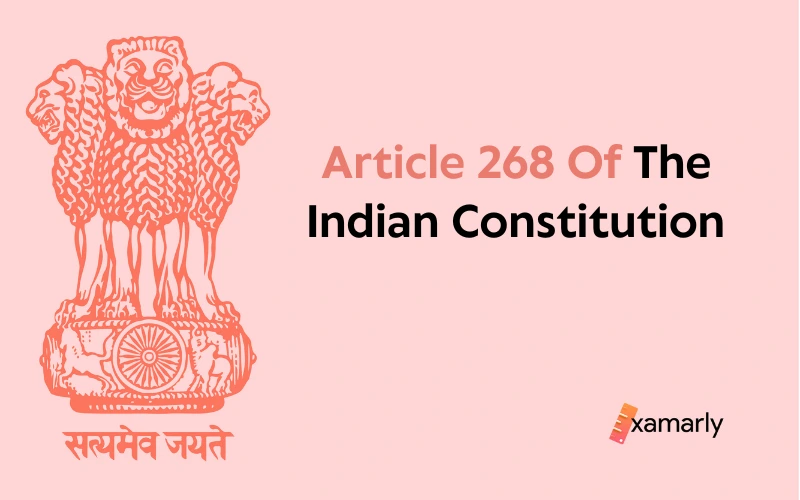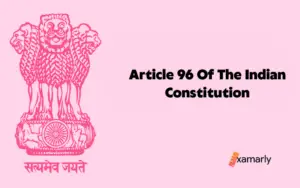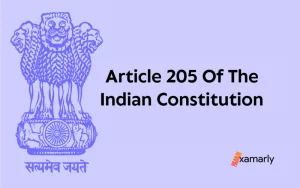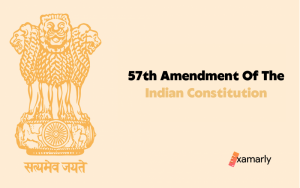The foundation of a nation’s economy is its taxation system, which ensures that revenues are stable, that economic expansion is controlled, and that industrial activity is supported. Article 268 of the Indian Constitution addresses several taxes that are imposed by the Central government but are collected and remitted by the state government.
This page provides a piece of useful information regarding Article 268 and Article 268A of the Constitution of India. This will enable you to understand why the latter Article was omitted from the Constitution.
Both Articles are a part of Part XII of the Indian Constitution.
What Is Article 268 Of The Indian Constitution?
The duties imposed by the Union but collected and appropriated by the States are covered by Article 268 of the Indian Constitution. The Constitutional provisions of the Article stated before are mentioned below:
- The Government of India will impose and collect any stamp duties that are listed on the Union List. However, it shall be collected—
- (a) by the Government of India, in the event that such duties are imposed inside any territory
- (b) in all other circumstances, by the states within each of which such duties are respectively imposed.
- In any given fiscal year, the proceeds from any such duty leviable inside a certain state will be allocated to that state rather than being included in the Consolidated Fund of India.
Which Amendment Has Amended Article 268?
The 7th Constitutional amendment and the 101st amendment of the Indian Constitution have modified Article 268.
Check out the linked article to know what changes have been done by these two amendments.
Why Article 268 Undergoes Revision?
The duties assessed by the Union but collected and appropriated by the states were referred to as Article 268 duties. According to this provision, states are responsible for collecting stamp duties and duties of excise on the medical and toilet preparation that are imposed by parliament.
It was pointless to leave this provision unaltered since excise would be incorporated into GST and there is a distinct purpose for tax revenue for the states.
This article is therefore modified which is stated before under the title “What is Article 268 of the Indian Constitution?”
Key Facts
- Article 268 incorporates the stamp duties that the Indian government imposes on bills of exchange, cheques, and promissory notes.
- These taxes are not accounted for in the Consolidated Fund of India since they are allocated by the state in which they were levied, as a result, they do not make a contribution to that fund.
- When it comes to Union territory, the funds will be given to the Indian Government.
- The central government is given sole control over the collection and appropriation of these taxes under Article 268 because they are included in the union list.
- The 101st Amendment further narrowed the limited scope of the revenue acquired under this Article.
Article 268A Of The Indian Constitution
The service tax imposed by the Union, collected and appropriated by the Union and the States is addressed under Article 268A of the Indian Constitution.
The said Article was inserted by the 88th amendment of the Indian Constitution in the 54th year of the Republic of India.
The Constitution (One Hundred and First Amendment) Act, 2016, removes the aforementioned article from the Constitution.
Why Article 268A Was Removed?
The revenue generated from the service tax, which is included in list 1 of the seventh schedule, will be shared according to the provisions of this article, which has been drafted for that purpose. Since states lack the authority to impose a service tax. This article serves as a means of sharing this tax.
Since the state will be allowed to impose SGST on services that are consumed under the GST regime, article 268 is no longer relevant.
Consequently, the Constitution (One Hundred and First Amendment) Act of 2016 totally repeals article 268A.
Conclusion
The Indian states have frequently voiced their concern that the federal government is preventing them from properly utilizing the taxing powers outlined in Articles 268 and 269 of the Constitution.
Particularly in relation to letters of credit, bills of lading, and general insurance policies, which have the effect of restricting governments’ ability to collect taxes and advance their development.
The potential for raising additional resources under Articles 268 and 269 has been raised as a suggestion by experts.
FAQs
What Is Article 268?
Article 268 of the Indian Constitution articulates the duties imposed by the Union but collected and appropriated by the States.
What Is Article 268A?
A service tax is levied by the Union and is collected and appropriated by both the Union and the States.
Which Amendment Has Revised Article 268?
The seventh constitutional amendment has modified Article 268 of the Constitution of India.
When Article 268A Was Inserted?
Article 268A was inserted into the constitution in 2004 as part of the 88th Amendment, which also brought service tax under the scope of Article 268.
When Article 268A Was Removed?
When the Goods and Services Tax (GST) was implemented as part of the 101st Constitutional Amendment, Article 268A was abolished and rolled into the GST.






